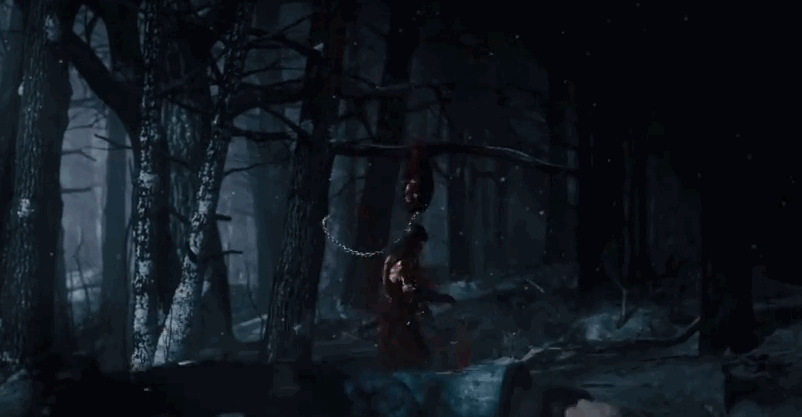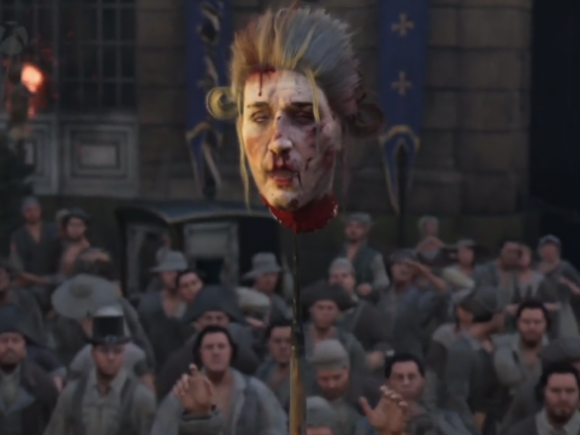Nearly half of all the people who play video games are women, but you wouldn’t know it by the video game industry’s biggest conference.
Only five women presented on stage at the major press events at E3, the video game industry’s huge conference, which took place in LA this week.
Sadly, that number won’t be surprising to anyone familiar with sexism in the tech industry, and the particularly appalling way women are treated in the video game industry.
But here’s the really shocking part. E3 actually featured more severed heads on stage than women: eight heads.
A lovely moment from “Assassin’s Creed”
No kidding. Someone was actually counting. Danielle Riendeau over at Polygon kept a running tally of speaking women presenters after seeing a tweet by Vlambeer developer Rami Ismail:
Playstation continues the "more severed heads" than female speakers trend. #E3
— Rami Ismail / رامي (@tha_rami) June 10, 2014
Microsoft, EA, Ubisoft, and Sony all had speaking women presenters.
Meanwhile, severed heads were featured from games, including “Assassin’s Creed: Unity” and “Mortal Kombat.”
In 2013, 59% of Americans played video games, according to the Entertainment Software Association. And of those people, 48% were female. So it’s not that women aren’t playing; it’s that they’re not being represented equally at the major press events. And that’s a shame.
Riendeau points out that companies don’t just randomly select who’s going to present for them. The decision is strategic, and not having many women presenters, sends a message.
She writes:
E3 is already a show that’s dominated by white men, and keeping the focus on those men during the most public events reinforces the feedback loop that the show is for, should represent, and sell to, white men.
And it’s not that there aren’t any women executives for companies to choose from. Several high-ranking execs in the gaming industry are women. (Even though one of them, Julie Larson-Green, who heads the Xbox team, was harassed because she’s a woman when she got the job.)
The message is loud and clear, not just at E3, but throughout the gaming world. For instance, Jenny Haniver, an avid “Call of Duty” player, chronicles her experiences being a female gamer on her website Not In The Kitchen Anymore. Since 2010, she has been posting recordings of how other gamers, usually men, act upon meeting a female gamer. As you can imagine, it’s not good.

Nintendo has tried to address the problem by creating a YouTube channel, called the Nintendo Girls Club, that’s aimed specifically toward young girls who like playing video games. Unfortunately, the channel is terribly sexist, and ends up perpetuating the stereotypes not ending them.
In an interview with Re/code, Aisha Tyler, a longtime gamer who was one of the five women presenting at E3, says she thinks that sexism in the industry is easing up.
The more people who come forward and talk about how much they love gaming, how much they talk about individuality and diversity, the more gamers of color that come out, and gay gamers that come out and everybody talking about what they love — that’s what the community has in common, a love of gaming.
Tyler not only presented for Ubisoft, but she’s also a character in the game “Watch Dogs.” She says that there is a shift in what kind of characters we see in video games. And that will lead to a shift in the mentality of the industry as a whole.
“I think we’re starting to see an evolution in characters, for sure. They’re starting to look more like the real world,” she says.
Here’s hoping that she’s right and that next year at E3, women will be at least as welcome as dismembered body parts. As Riendeau points out:
It wouldn’t hurt the publishers to pay more mind to diversity when choosing people to speak at press events. And it would certainly help make E3 a slightly more welcoming place for the rest of the 75 percent or so of people [besides white men] that make up the population.



 The E3 merch is pretty boring…with one exception【RN24 at E3】
The E3 merch is pretty boring…with one exception【RN24 at E3】 Booth babes, swag, and cosplay: E3 is a sexy, crazy place【RN24@E3】
Booth babes, swag, and cosplay: E3 is a sexy, crazy place【RN24@E3】 Sunset Overdrive takes over E3【RN24@E3】
Sunset Overdrive takes over E3【RN24@E3】 Our favorite photos from Day Three of E3 2014【RN24@E3】
Our favorite photos from Day Three of E3 2014【RN24@E3】 Photos from the Xbox E3 2014 Media Briefing【RN24 at E3】
Photos from the Xbox E3 2014 Media Briefing【RN24 at E3】 Lawson adds doughnuts to its convenience store sweets range, but are they good enough to go viral?
Lawson adds doughnuts to its convenience store sweets range, but are they good enough to go viral? Ramen for 99 yen?!? Best value-for-money noodles found at unlikely chain in Japan
Ramen for 99 yen?!? Best value-for-money noodles found at unlikely chain in Japan Viral Japanese cheesecake from Osaka has a lesser known rival called Aunt Wanda
Viral Japanese cheesecake from Osaka has a lesser known rival called Aunt Wanda Fives places around Japan to appreciate the plum blossoms this season
Fives places around Japan to appreciate the plum blossoms this season New smartphone game turns car models into anime girls with model-worthy looks
New smartphone game turns car models into anime girls with model-worthy looks Here are the top ten foodie factory tours for the fall throughout Japan
Here are the top ten foodie factory tours for the fall throughout Japan Sento bathhouse gets a new lease on life as a Tokyo cafe and office space
Sento bathhouse gets a new lease on life as a Tokyo cafe and office space The 10 best day trips from downtown Tokyo【Survey】
The 10 best day trips from downtown Tokyo【Survey】 Draw like a Studio Ghibli anime artist with exclusive watercolour set approved by Hayao Miyazaki
Draw like a Studio Ghibli anime artist with exclusive watercolour set approved by Hayao Miyazaki Picture of a pufferfish vomiting water is the Japanese Internet’s newest darling
Picture of a pufferfish vomiting water is the Japanese Internet’s newest darling Starbucks Japan releases first-ever Hinamatsuri Girls’ Day Frappuccino
Starbucks Japan releases first-ever Hinamatsuri Girls’ Day Frappuccino Japanese restaurant chain serves Dragon Ball donuts and Senzu Beans this spring
Japanese restaurant chain serves Dragon Ball donuts and Senzu Beans this spring Highest Starbucks in Japan set to open this spring in the Tokyo sky
Highest Starbucks in Japan set to open this spring in the Tokyo sky Japan Extreme Budget Travel! A trip from Tokyo to Izumo for just 30,000 yen [Part 1]
Japan Extreme Budget Travel! A trip from Tokyo to Izumo for just 30,000 yen [Part 1] Japan has only one airport named after a samurai, so let’s check out Kochi Ryoma【Photos】
Japan has only one airport named after a samurai, so let’s check out Kochi Ryoma【Photos】 Japan Extreme Budget Travel! A trip from Tokyo to Izumo for just 30,000 yen [Part 2]
Japan Extreme Budget Travel! A trip from Tokyo to Izumo for just 30,000 yen [Part 2] Japan’s craziest burger chain takes menchi katsu to new extreme levels
Japan’s craziest burger chain takes menchi katsu to new extreme levels Japanese drugstore sells onigiri at pre-stupid era prices, but how do they compare to 7-Eleven?
Japanese drugstore sells onigiri at pre-stupid era prices, but how do they compare to 7-Eleven? Yakuzen ramen restaurant in Tokyo is very different to a yakuza ramen restaurant
Yakuzen ramen restaurant in Tokyo is very different to a yakuza ramen restaurant Tokyo Skytree turns pink for the cherry blossom season
Tokyo Skytree turns pink for the cherry blossom season Japan’s newest Shinkansen has no seats…or passengers [Video]
Japan’s newest Shinkansen has no seats…or passengers [Video] Starbucks Japan releases new sakura goods and drinkware for cherry blossom season 2026
Starbucks Japan releases new sakura goods and drinkware for cherry blossom season 2026 Foreigners accounting for over 80 percent of off-course skiers needing rescue in Japan’s Hokkaido
Foreigners accounting for over 80 percent of off-course skiers needing rescue in Japan’s Hokkaido Super-salty pizza sends six kids to the hospital in Japan, linguistics blamed
Super-salty pizza sends six kids to the hospital in Japan, linguistics blamed Starbucks Japan unveils new sakura Frappuccino for cherry blossom season 2026
Starbucks Japan unveils new sakura Frappuccino for cherry blossom season 2026 Foreign tourists in Japan will get free Shinkansen tickets to promote regional tourism
Foreign tourists in Japan will get free Shinkansen tickets to promote regional tourism The 10 most annoying things foreign tourists do on Japanese trains, according to locals
The 10 most annoying things foreign tourists do on Japanese trains, according to locals Take a trip to Japan’s Dododo Land, the most irritating place on Earth
Take a trip to Japan’s Dododo Land, the most irritating place on Earth Naruto and Converse team up for new line of shinobi sneakers[Photos]
Naruto and Converse team up for new line of shinobi sneakers[Photos] Is China’s don’t-go-to-Japan warning affecting the lines at a popular Tokyo gyukatsu restaurant?
Is China’s don’t-go-to-Japan warning affecting the lines at a popular Tokyo gyukatsu restaurant? Survey asks foreign tourists what bothered them in Japan, more than half gave same answer
Survey asks foreign tourists what bothered them in Japan, more than half gave same answer Japan’s human washing machines will go on sale to general public, demos to be held in Tokyo
Japan’s human washing machines will go on sale to general public, demos to be held in Tokyo Starbucks Japan releases new drinkware and goods for Valentine’s Day
Starbucks Japan releases new drinkware and goods for Valentine’s Day We deeply regret going into this tunnel on our walk in the mountains of Japan
We deeply regret going into this tunnel on our walk in the mountains of Japan Studio Ghibli releases Kodama forest spirits from Princess Mononoke to light up your home
Studio Ghibli releases Kodama forest spirits from Princess Mononoke to light up your home Major Japanese hotel chain says reservations via overseas booking sites may not be valid
Major Japanese hotel chain says reservations via overseas booking sites may not be valid Put sesame oil in your coffee? Japanese maker says it’s the best way to start your day【Taste test】
Put sesame oil in your coffee? Japanese maker says it’s the best way to start your day【Taste test】 No more using real katana for tourism activities, Japan’s National Police Agency says
No more using real katana for tourism activities, Japan’s National Police Agency says A quick look at the Sony, Xbox and Nintendo booths at E3 2014【RN24@E3】
A quick look at the Sony, Xbox and Nintendo booths at E3 2014【RN24@E3】 Wolverine plays Just Dance 2015 at E3 – Why? We have no idea either【E3】
Wolverine plays Just Dance 2015 at E3 – Why? We have no idea either【E3】 Our favorite photos from Day Two of E3 2014【RN24@E3】
Our favorite photos from Day Two of E3 2014【RN24@E3】 RocketNews24 at E3: So much merch!
RocketNews24 at E3: So much merch! Pre-E3 poll hints at lack of interest in Microsoft’s newest console
Pre-E3 poll hints at lack of interest in Microsoft’s newest console Capcom joins Microsoft to release a zombie plague on E3
Capcom joins Microsoft to release a zombie plague on E3 We’re going to E3! What do you want to see?
We’re going to E3! What do you want to see? Oculus Rift vs Project Morpheus: The VR headsets duke it out at E3【RN24@E3】
Oculus Rift vs Project Morpheus: The VR headsets duke it out at E3【RN24@E3】 Our favorite photos from Day One of E3 2014【E3】
Our favorite photos from Day One of E3 2014【E3】 Hey you, we’re at E3 RIGHT NOW! (Don’t forget to vote!)
Hey you, we’re at E3 RIGHT NOW! (Don’t forget to vote!) NicoNico Livestreaming E3 in English! 【PSA】
NicoNico Livestreaming E3 in English! 【PSA】 The Guardian: Sony to present The Last Guardian at E3
The Guardian: Sony to present The Last Guardian at E3 These new Gamecube-style Wii U controllers are gorgeous, (almost) exactly what we wanted【E3】
These new Gamecube-style Wii U controllers are gorgeous, (almost) exactly what we wanted【E3】 Sony promises no restrictions on used games for PlayStation 4 – releases cheeky video to rub it in
Sony promises no restrictions on used games for PlayStation 4 – releases cheeky video to rub it in A pink unicorn and a yellow hippo dance to “What Does the Fox Say?” on Just Dance 2015【E3】
A pink unicorn and a yellow hippo dance to “What Does the Fox Say?” on Just Dance 2015【E3】 Playing ‘The Deep’ on Sony’s Project Morpheus was terrifying【RN24@E3】
Playing ‘The Deep’ on Sony’s Project Morpheus was terrifying【RN24@E3】